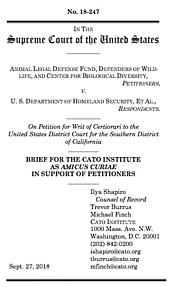The Constitution vests “all legislative power” in Congress, while the executive branch enforces those laws (rather than making or un-making them). Courts from the early days of the republic have maintained this division by preventing the delegation of the legislative power to the executive. To enforce this non-delegation doctrine the Court established the “intelligible principle” test. For a law to pass, Congress must (1) designate an agent or actor, (2) clearly direct the purpose or goal of the law, and (3) set boundaries to the agent’s powers. But the modern Court has stopped applying this doctrine; the last time it struck down a law on non-delegation grounds was in 1935. Since then it has deferred to larger and larger grants of legislative power to executive agencies.
The weakness of the intelligible-principle test lies in the third prong of imposing boundaries for the delegated powers. There is no definite line for how much discretion or power is “too much.” Even James Madison acknowledged the line between permitted and prohibited sharing of power can get blurry. The Court has long recognized that the branches can coordinate for efficiency, but has declined to find any practical limit to the powers Congress can delegate. The result is that executive agencies are making increasingly complex and restrictive laws, completely insulated from and un-accountable to the people.
In our brief, we argue that the Court must re-establish the non-delegation doctrine, either by refining or reforming the intelligible-principle test. It must make it more than an unenforceable truism. The ability to suspend laws at the secretary’s discretion is tantamount to the ability to enforce or repeal laws at will: an essentially legislative power. Unlimited discretion prevents the Court from having any standard by which it can measure abuses of power. The Court need not adopt a stringent test that would require abolishing years of precedent and many bureaucratic agencies, but if the non-delegation doctrine means anything at all, it must at least mean that unlimited discretion to suspend laws is too much.




